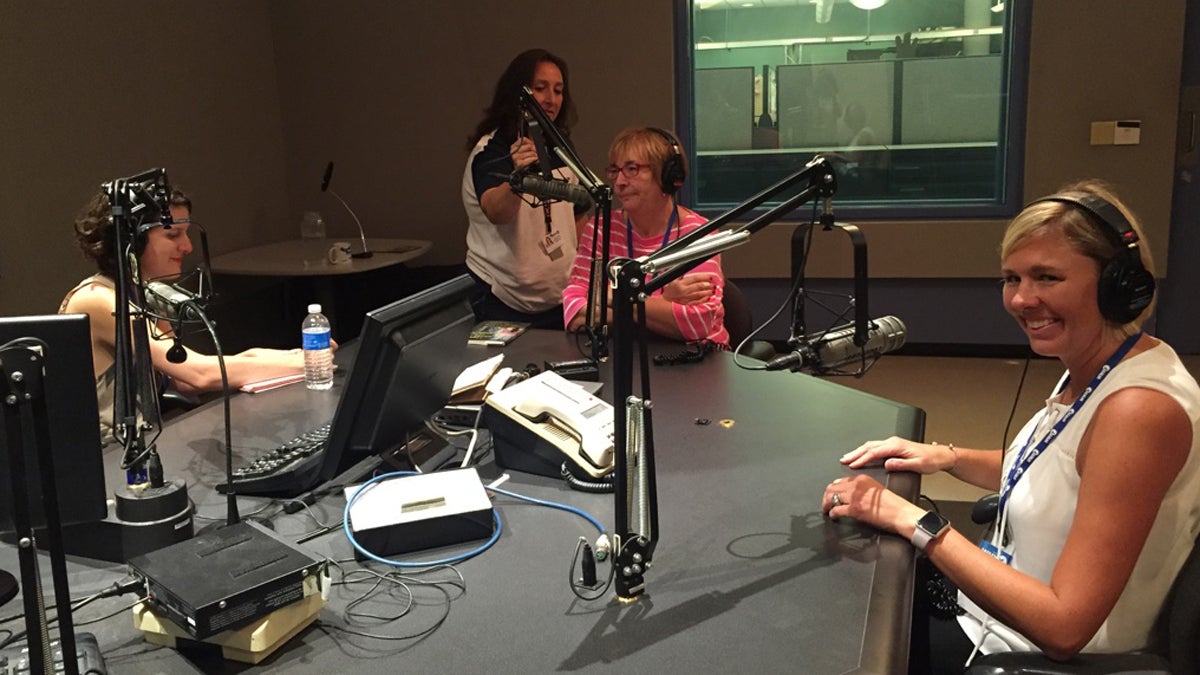Anchoring or enabling? New book explores caring for children with simultaneous disorders

As WHYY engineer Diana Martinez adjusts a microphone, journalist Anne Hoffman (from left) interviews co-authors Mary Ryan Woods and Adrienne Murray (Photo by Megan Lepore)
Nearly eight million Americans suffer from co-occurring substance abuse disorders and mental illness. And when a young person has co-occurring disorders — such as bipolar diagnosis and an opioid addiction — families can feel overwhelmed and isolated.
A new book seeks to provide a resource for their family members — specifically, mothers.
The book, “I Didn’t Cause it, I Can’t Change It: How Mothers of Adult Children with Co-Occurring Disorders Have Coped,” tells the stories of 14 women who share their experiences of “bearing the emotional brunt” of caring for someone with two diseases.
The authors — Mary Ryan Woods and Adrienne Murray — appeared recently for a panel discussion and interview at WHYY studios in Philadelphia.
Ryan Woods leads a treatment program called WestBridge for those with co-occurring diseases in New Hampshire.
“These moms are resilient, they’re go-getters, they’re advocates,” she said. “They’re also very isolated and alone. For each of them, they had to make sure their family member was taken care of before they could take of themselves.”
Murray, her co-author, agreed.
“There are so many Americans who are going through this. When the moms sat down and started telling their stories, you know, a lot of them had already worked their way through a lot of the hardship,” she said. “But for them to see that there were so many people who had such similar stories made them feel not so alone.”
Families often aren’t fully included in the treatment plan for their dual-diagnosis kids, the authors said. Many times, parents are labeled as enabling or co-dependent.
Parents are seen that way in part because brain diseases are so much more stigmatized than other illnesses, said Ryan Woods.
“If your son or daughter had stage 4 leukemia and you were doing everything possible to keep that son or daughter alive, would you consider that enabling?” she said.
Instead, Ryan Woods said she prefers to look at the problem systemically, arguing that parents are typically reacting to a system that isn’t adequately equipped to handle their children’s co-occurring disorders. She and Murray prefer the term “anchoring” instead of “enabling.”
Ultimately, though, she said the main takeaway from the book is a message of hope.
“Families are resilient. No matter what you’re getting through, if you have the right effective support and skills, you can get through it,” she said. “There is a path through the woods.”
The authors say a dads’ book could be next.
WHYY is your source for fact-based, in-depth journalism and information. As a nonprofit organization, we rely on financial support from readers like you. Please give today.

